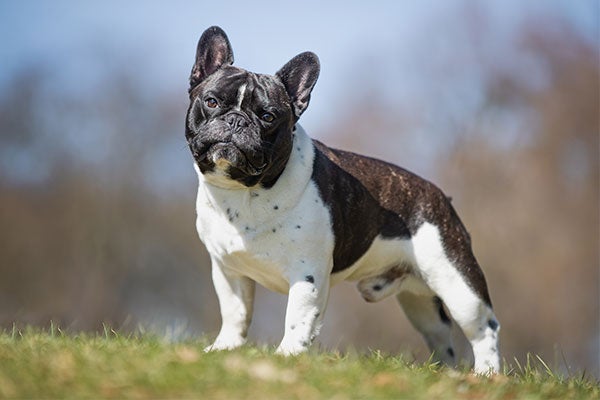French Bulldogs may be small in size, but they have a big job to fulfill. As natural companions and loyal members of the family, these adorable canines are known for their wide range of talents and responsibilities. Whether it’s providing emotional support to their owners, serving as therapy dogs, or even participating in various dog sports, French Bulldogs are versatile and dedicated professionals.
Originating from France in the 1800s, the French Bulldog was initially bred as a companion dog for lace workers. However, over the years, their role has expanded to encompass various jobs and responsibilities. Apart from their innate ability to bring joy and companionship, French Bulldogs are highly adaptable and excel in roles such as therapy and emotional support. Their calm and affectionate nature, combined with their intelligence, make them ideal candidates for providing comfort and assistance to those in need. With their loyal and loving temperament, French Bulldogs have become irreplaceable partners in the lives of countless individuals.
A French Bulldog’s job is to be a loving and loyal companion. Known for their affectionate nature, French Bulldogs make excellent family pets and are known to bond closely with their owners. They are also great watchdogs, alerting their families to any potential threats or strangers. Their small size and low exercise needs make them well-suited for apartment living, and they are often sought after for emotional support and therapy work due to their gentle and friendly demeanor.

The Versatile Roles of French Bulldogs
French Bulldogs are known for their adorable appearance and friendly nature, but many people wonder what exactly is the job of a French Bulldog? These lovable creatures have a variety of roles and responsibilities that make them valuable members of households, families, and even professional settings. In this article, we will explore the different jobs that French Bulldogs can perform and the qualities that make them well-suited for these tasks.
1. Companion and Family Pet
One of the main jobs of a French Bulldog is to be a loyal companion and family pet. They are known for their affectionate and playful nature, making them excellent companions for both individuals and families. French Bulldogs love to be around people and they form strong bonds with their owners. They provide comfort, companionship, and entertainment to their human counterparts, making them an essential part of the family.
French Bulldogs are great with children, and they often become the best friends of kids. They are patient and gentle, making them a suitable choice for families with young children. They love to play and participate in various family activities, whether it’s a game of fetch in the backyard or watching a movie on the couch. French Bulldogs are always there to bring joy and laughter to their family members.
Moreover, French Bulldogs are excellent therapy dogs. Their calm and friendly demeanor makes them ideal for providing emotional support to individuals in need, such as those with anxiety or depression. Their presence can have a positive impact on people’s mental well-being, making them valuable in therapeutic settings.
2. Watchdog
While French Bulldogs may not have the intimidating size of a guard dog, they are actually quite effective as watchdogs. They have a strong instinct to protect their homes and their families. French Bulldogs are alert and attentive, and they will notify their owners if they sense any potential danger or suspicious activity. Their loyal nature and their loud, distinctive bark make them excellent at alerting their owners to any potential intruders.
French Bulldogs are also known for being wary of strangers. They may initially be reserved when meeting new people, but they quickly warm up to them once they sense that they are friendly. This makes them great at assessing people’s intentions and providing an extra layer of security for their owners.
3. Emotional Support Animals
French Bulldogs excel at being emotional support animals (ESAs). These animals play a vital role in providing comfort, companionship, and emotional support to individuals who may have mental health conditions or disabilities. French Bulldogs are naturally empathetic and intuitive, and they have a calming presence that can help ease anxiety and provide emotional stability to their owners.
Many people with conditions like anxiety, depression, or PTSD find solace and emotional relief through the companionship of a French Bulldog. These dogs are always there to offer love, empathy, and a listening ear. Their unconditional love and affection can have a significant positive impact on the mental well-being of their owners.
4. Therapy Dogs
In addition to being emotional support animals, French Bulldogs can also serve as therapy dogs. Therapy dogs undergo special training to provide comfort and companionship to people in various settings, such as hospitals, nursing homes, schools, and rehabilitation centers. French Bulldogs have a unique ability to connect with people and to bring a sense of joy and peace to those they interact with.
Therapy dogs like French Bulldogs are trained to remain calm and composed in different environments and to interact with people of all ages. They visit patients, students, or individuals in need, and their presence can have a positive impact on their emotional well-being. Therapy dogs provide a sense of comfort and relief, even in challenging or stressful situations.
5. Show Dogs
French Bulldogs are also popular participants in dog shows. Show dogs are judged against breed standards and compete against other dogs of the same breed. French Bulldogs are known for their unique appearance and distinctive features, such as their bat-like ears, short snouts, and compact bodies. They are often recognized for their adorable and expressive faces.
Participating in dog shows requires proper training and grooming to showcase the best qualities of the French Bulldog breed. Show dogs go through rigorous preparation and compete in various categories, including conformation, obedience, and agility. French Bulldogs have gained popularity in the show dog world due to their charming personality and undeniable charm.
The Importance of French Bulldogs as Working Dogs
French Bulldogs may not be traditionally considered as working dogs, but they do play important roles in various professional settings. Their intelligence, adaptability, and friendly nature make them well-suited for different types of work that require their unique qualities. Let’s explore some of these roles.
1. Service Dogs
French Bulldogs can be trained to work as service dogs for individuals with disabilities. Service dogs undergo extensive training to assist people with physical impairments, mobility limitations, or other disabilities. They are trained to perform specific tasks to help their owners with daily activities and to enhance their independence.
French Bulldogs can be trained to provide support with tasks such as opening doors, retrieving objects, or providing stability and support while walking. Their small size and strong intelligence make them suitable for indoor environments, where they can navigate tight spaces and assist their owners effectively.
2. Search and Rescue Dogs
While French Bulldogs may not have the physical capabilities to perform search and rescue operations in harsh terrains, they can still contribute to search and rescue efforts. French Bulldogs are known for their keen sense of smell, which makes them valuable in detecting human scent. They can be trained to locate missing individuals or to identify specific scents in search and rescue scenarios.
French Bulldogs can assist search and rescue teams by alerting them to the presence of possible victims or by providing comfort and emotional support to individuals affected by natural disasters or other traumatic events. Their friendly and empathetic nature can be a source of consolation during difficult times.
3. Hearing Dogs
Hearing dogs, also known as signal dogs, are trained to assist individuals who are deaf or hard of hearing. They are trained to respond to specific sounds or alerts and to inform their owners about important auditory cues. While French Bulldogs may not have the same hearing capabilities as certain breeds specifically bred for this purpose, their intelligence and ability to learn commands can make them effective hearing dogs.
French Bulldogs can be trained to respond to doorbells, fire alarms, or other vital sounds. They can alert their owners and direct their attention to important auditory cues that they may not be able to hear on their own. French Bulldogs as hearing dogs can improve the overall quality of life and enhance communication for individuals with hearing loss.
4. Celebrity Dogs
French Bulldogs are often seen in the company of celebrities, and they are sometimes referred to as “celebrity dogs.” While this may not be a traditional job, it showcases the French Bulldog’s ability to bring joy, companionship, and style to the lives of celebrities and other influential individuals. Their adorable appearance, combined with their friendly and easy-going nature, makes them popular companions for the rich and famous.
French Bulldogs often accompany their celebrity owners to events, red carpet appearances, or on social media platforms. They have become symbols of luxury and status, and their presence adds an element of charm and cuteness to the public image of celebrities.
Conclusion
French Bulldogs have a wide range of jobs and roles that they perform with utmost dedication and natural talent. From being loyal companions and family pets to serving as therapy dogs and working in professional settings, French Bulldogs bring joy, comfort, and invaluable assistance to the lives of their owners.
Whether it’s providing emotional support, protecting their homes, or excelling in specialized training, French Bulldogs showcase their versatility and adaptability. These remarkable dogs have proven time and time again that they are much more than just adorable faces—they are devoted and hardworking companions who make a significant impact on the lives of those around them.
Key Takeaways: What is the job of a French Bulldog?
- A French Bulldog’s main job is to be a loving and loyal companion.
- They are great family pets and get along well with children and other animals.
- French Bulldogs can also be therapy dogs, providing comfort and emotional support to those in need.
- They excel in activities like obedience training and agility, often participating in dog sports.
- Some French Bulldogs are used as service dogs, assisting people with disabilities in their daily tasks.
Frequently Asked Questions
A French Bulldog has a charming and lovable personality, but many people wonder about their specific job or role. Here are some common questions and answers related to the job of a French Bulldog:
1. What are the typical jobs of a French Bulldog?
A French Bulldog doesn’t have a specific job like working dogs such as police dogs or service dogs. However, they excel in being companion animals and family pets. Their main job is to provide love, companionship, and entertainment to their owners.
French Bulldogs are known for being excellent emotional support animals. They have a knack for sensing their owner’s emotions and offering comfort when needed. Additionally, they can also be trained for basic obedience and agility, participating in activities such as obedience trials or fun obstacle courses.
2. Can French Bulldogs be therapy dogs?
Yes, French Bulldogs can make wonderful therapy dogs. With their affectionate nature and friendly disposition, they can visit hospitals, nursing homes, and schools to bring comfort and joy to people in need. Their small size also makes them easier to handle in certain environments.
However, it’s important to note that not all French Bulldogs are suitable for therapy work. Each dog has its own temperament and personality, so it’s essential to assess their individual traits and undergo proper training and evaluation to ensure they can handle the responsibilities of a therapy dog.
3. Are French Bulldogs good at guarding or protecting?
While French Bulldogs may not be natural guard dogs due to their friendly and non-aggressive nature, they can still act as efficient watchdogs. They are alert and attentive to their surroundings, making them quick to alert their owners about any potential intruders or suspicious activities.
However, it’s important to note that French Bulldogs should never be relied upon as the sole means of home security. They are not aggressive or physically imposing enough to deter intruders. Instead, they serve as excellent companions who can bring joy to your life while also offering a sense of security within your home.
4. Can French Bulldogs be trained for specific tasks?
French Bulldogs are intelligent and eager to please, which makes them trainable for various tasks. While they may not be well-suited for demanding tasks or high-level work like some other breeds, they can still excel in basic obedience training, agility courses, and tricks.
For example, French Bulldogs can be taught to sit, stay, come when called, walk on a leash, and perform simple tricks like giving paw or rolling over. Their small size and intelligence make them capable of learning and mastering these tasks with proper training, consistency, and positive reinforcement.
5. Are French Bulldogs well-suited for families with children?
Yes, French Bulldogs are generally great companions for families with children. They have a friendly and patient nature, which makes them tolerant of children’s playful behavior.
However, it’s important to supervise interactions between French Bulldogs and young children to ensure both parties are safe. French Bulldogs have a sturdy build but are still a small breed, so they should be handled with care to avoid accidental injuries. Teaching children how to properly interact with dogs and respecting the dog’s boundaries is crucial for a harmonious relationship.

A French Bulldog’s primary job is that of a companion and family pet. They are known for their loving and affectionate nature, making them excellent companions for people of all ages.
French Bulldogs also excel in therapy work, providing emotional support and comfort to those in need. With their small size and easygoing temperament, they are well-suited for therapy visits to hospitals, nursing homes, and schools.
